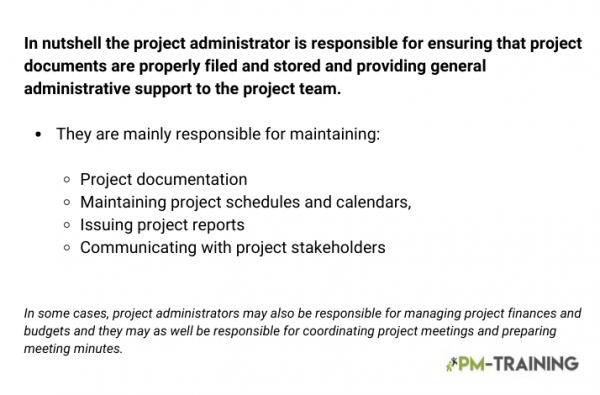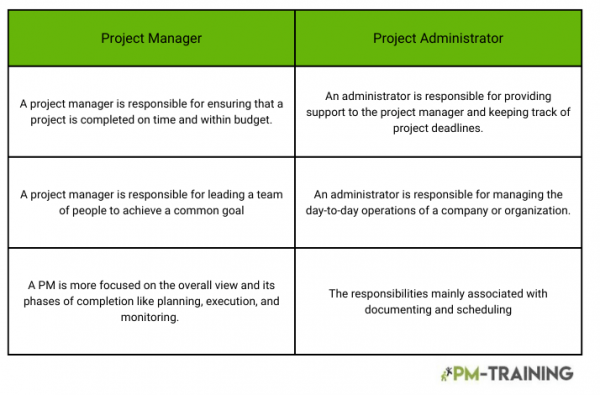A project administrator is a professional who is responsible for planning, executing, and monitoring the progress of a project. They work closely with the project manager to ensure that the project stays on track and is completed within the agreed-upon timeframe.
This includes the coordination and management of project resources, as well as the development and implementation of project plans. The project administrator is also responsible for tracking the progress of the project and ensuring that it is on track to meet its goals. Project administrators also play a vital role in communicating updates and project changes to all stakeholders.
- Duties of a project administrator
- How to become a project administrator?
- Difference between the project manager and administrator
- What are the skills of a project administrator?
- Education and training to become a Project Administrator
- What does a Project Administrator do?
- What are the differences between a project administrator and a project coordinator?
- What are the main differences between a project administrator and a Project Manager?
As you can see, project administrators play a crucial role in the success of a project. If you are thinking of starting a project, be sure to find a qualified project administrator who can help you plan and execute your project flawlessly. This includes the coordination and management of project resources, as well as the development and implementation of project plans.

Duties of a project administrator
In short, project administrators play a vital role in keeping projects on track and ensuring that they are completed on time and within budget.
They should also be able to work well under pressure and handle multiple tasks simultaneously.
Here are five things that project administrators do:
- Develop project plans and schedules
- Track project deadlines and milestones and especially identify the risk in order to assess them
- Assign tasks to team members
- Communicate with clients while coordinating project teams members
- Manage project resources.
- Create and maintain project reports
- Manage project files and documentation
As you can see they are responsible for a wide range of activities, from developing project schedules to tracking progress and managing risks.
In short, project administrators are the backbone of any successful project.
How to become a project administrator?
Becoming a project administrator requires both experience and training. If you have experience working on projects, that’s a great place to start. You can also look into taking classes or getting a certification in project management.
With the right experience and training, you can become a project administrator and help ensure that projects are completed on time and within budget.
If you are organized and efficient and have excellent communication and interpersonal skills, you may be well-suited for a career as a project administrator. Here are a few tips on how to become a project administrator:
- Get a degree in project management or a related field.
- Gain experience by working on small projects or volunteering for larger projects.
- Develop strong time management, communication, and interpersonal skills.
- Be able to work well under pressure and handle multiple tasks simultaneously.
Difference between the project manager and administrator
The terms project manager and administrator are often used interchangeably, but there is a big difference between the two roles
The main difference between a project manager and an administrator is the level of responsibility they have:

So which role is right for you?
It depends on your skills and interests. If you’re good with numbers and enjoy planning and organizing, then a career as a project administrator could be a good fit for you. If you’re more interested in the big picture and enjoy problem-solving, then a career as a project manager would be better.
What are the skills of a project administrator?
Project administrators need to wear many hats. They should be comfortable with handling project finances, scheduling, risk management, and more.
They need to be able to work with a variety of personality types and be able to resolve conflict.
They should also be great communicators and have a good understanding of technology.
There are a variety of skills that are necessary for a successful project administrator.
Below are some key skills that you should focus on developing:
- Communication skills
A project administrator needs to be able to effectively communicate with all stakeholders in a project. This includes being able to listen to others, understand their needs, and communicate information clearly.
A project administrator must be able to communicate effectively with the team, the clients, and the stakeholders. They must be able to understand the needs of all parties and relay that information in a clear and concise manner.
- Strong organizational skills
A project administrator needs to be extremely organized in order to keep track of all the moving parts in a project. This includes being able to create and maintain detailed project plans, as well as keeping track of deadlines, risks, and issues.
- Problem-solving
A project administrator needs to be able to quickly identify and solve problems that arise in a project. This includes being able to troubleshoot issues, identify risks, and develop mitigation plans.
- Time Management
There is often a lot of pressure to complete a project on time and within budget. A project administrator must be able to manage their time and the time of the team in order to meet these deadlines. It is important to mention that flexibility will allow you to manage to adapt when things come through.
- Detail-Oriented
You will need to be able to pay attention to detail in order to catch errors and prevent problems. This may include that you will need to be able to adapt to changing conditions and priorities.
- Stress management Skills
You will need to be able to handle the stress of managing multiple projects. Especially you are in charge of keeping track of multiple deadlines
If you’re looking to be a better project administrator, then you should start by developing these skills.
Education and training to become a Project Administrator
This career path can be a good choice for those with strong organizational skills and an interest in project management.
Project administrators typically have a college degree in business or a related field. Many companies also require project administrators to have experience working in project management or a related field.
The median project administrator salary is $60,000 per year but of course, salaries can vary based on experience, education, and location.
What does a Project Administrator do?
Project administrators are responsible for overseeing the project from start to finish. This includes tasks such as creating the project schedule, assigning tasks to team members, and monitoring the project’s progress.
What are the differences between a project administrator and a project coordinator?
A project administrator is typically responsible for the administrative tasks associated with a project, such as managing files, documenting meeting minutes, and maintaining project schedules. A project coordinator, on the other hand, is typically responsible for coordinating the day-to-day activities of a project, such as assigning tasks to team members and ensuring that deadlines are met.
What are the main differences between a project administrator and a Project Manager?
So, what’s the difference between the two roles? A project manager is responsible for heading up a team of people and seeing a project through from start to finish. An administrator, on the other hand, is responsible for the day-to-day operations of a company or organization.
